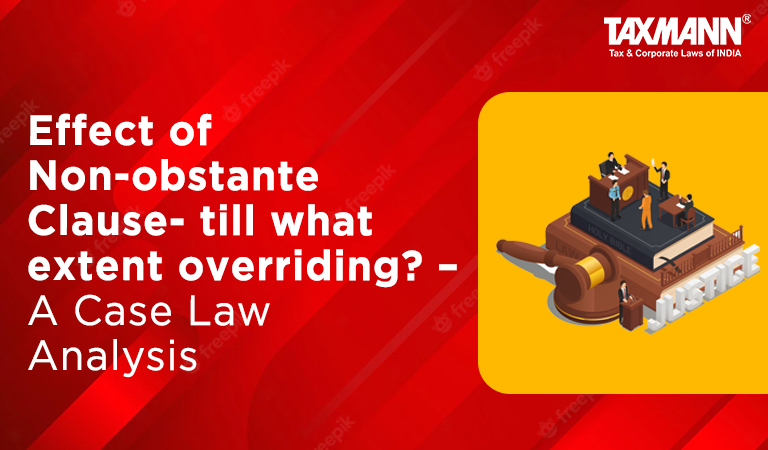Effect of Non-obstante Clause- till what extent overriding? – A Case Law Analysis
- Blog|News|Income Tax|
- < 1 minute
- By Taxmann
- |
- Last Updated on 30 April, 2022

Madhvi Desai – [2022] 137 taxmann.com 458 (Article)
The legislative intent behind inserting non-obstante clause in any provision is to enforce overriding effect of that provision over any other provision in that law or any other prevailing law. When two conflicting views arise from two distinct provisions, it would create chaos in overall implementation of that law. In order to overcome such difficulty, non-obstante clause is inserted in one provision, which would supersede other provisions, whenever necessary, as deem fit by the law makers.
Yet, such non-obstante clause always surround with questions of its overall impact and applicability. Would it really supersede every other provision of the law? Would other provisions become redundant when hit by provision containing non-obstante clause? The simple answer is NO!
Time to time, various High Courts and Supreme Court have looked into this substantial question of law and delivered some remarkable principles on interpretation.
Click Here To Read The Full Article
Disclaimer: The content/information published on the website is only for general information of the user and shall not be construed as legal advice. While the Taxmann has exercised reasonable efforts to ensure the veracity of information/content published, Taxmann shall be under no liability in any manner whatsoever for incorrect information, if any.

Taxmann Publications has a dedicated in-house Research & Editorial Team. This team consists of a team of Chartered Accountants, Company Secretaries, and Lawyers. This team works under the guidance and supervision of editor-in-chief Mr Rakesh Bhargava.
The Research and Editorial Team is responsible for developing reliable and accurate content for the readers. The team follows the six-sigma approach to achieve the benchmark of zero error in its publications and research platforms. The team ensures that the following publication guidelines are thoroughly followed while developing the content:
- The statutory material is obtained only from the authorized and reliable sources
- All the latest developments in the judicial and legislative fields are covered
- Prepare the analytical write-ups on current, controversial, and important issues to help the readers to understand the concept and its implications
- Every content published by Taxmann is complete, accurate and lucid
- All evidence-based statements are supported with proper reference to Section, Circular No., Notification No. or citations
- The golden rules of grammar, style and consistency are thoroughly followed
- Font and size that’s easy to read and remain consistent across all imprint and digital publications are applied



 CA | CS | CMA
CA | CS | CMA
